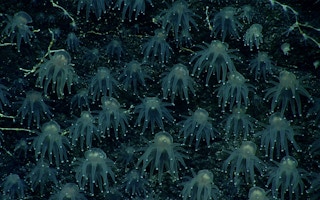A three-week negotiations gridlock ended on Friday (28 July) with the pro-mining lobby failing to secure a green light to begin seabed extraction.
To continue reading, subscribe to Eco‑Business.
There's something for everyone. We offer a range of subscription plans.
- Access our stories and receive our Insights Weekly newsletter with the free EB Member plan.
- Unlock unlimited access to our content and archive with EB Circle.
- Publish your content with EB Premium.
Environmental campaign groups Greenpeace and Planet Tracker criticised the pro-mining camp’s potentially harmful and misleading lobbying – that deep-sea mining is essential to power the world’s energy transition – as greenwashing.
“It’s clear that most governments do not want their legacy to be green-lighting ocean destruction,” said Greenpeace International oceans campaigner Louisa Casson. She added that seafloor quarrying remains a looming threat even though rules for the commercial extraction of ocean metals did not get the go-ahead.
The 28th session of the International Seabed Authority (ISA) – the United Nations-backed body tasked with governing the exploitation of deep seabed minerals in the high seas – concluded tense negotiations with an eleventh hour compromise to launch formal debates on regulation and the risks of seabed extraction when the assembly reconvenes next year.
Greener future?
As demand for energy transition minerals rises and certain countries push for seabed mining to be permitted on an industrial scale, some ISA member nations have taken a hardline over the granting of deep-sea quarrying concessions. Proponents of deep-sea mining point to vast untapped deposits of rare elements that are used to make solar panels, wind turbines and electric car batteries that are found on the seabed.
China – with its burgeoning electric vehicle market – and the island-nation of Nauru have emerged as the most vocal supporters of deep-sea mining, the president of the small Micronesian isle recently asserting that the industry “has the potential to help accelerate our energy transition to combat climate change.”
“
Deep-sea mining companies promise to deliver a green future built on metals that studies show the seabed simply won’t provide. Banks and investors should steer clear of this greenwash and break ties with businesses that are incompatible with a sustainable future.
Iris Menn, executive director, Greenpeace Switzerland
Nauru is the pioneering ISA state sponsor of Canada-based mining firm The Metals Company (TMC) in its campaign to lobby for accelerated deep-sea mining. TMC claims that there is enough seabed metal to power the energy transition while avoiding the problems associated with land mining such as biodiversity loss, toxic pollution and human rights abuses.
Advocacy groups and financial institutions, however, have lambasted this claim stating that oceanfloor drilling will likely do more harm than good.
“Deep-sea mining is not aligned with global goals to protect and restore nature and could expose financial institutions to significant policy, regulatory and reputational risks including greenwashing,” warned non-profit Planet Tracker in its The Sky High Cost of Deep Sea Mining report.
The non-profit said that stripping the ocean floor of mineral resources risks not only wiping out undiscovered species, but could cause irreversible damage to the global biosphere.
Planet Tracker estimates that if ocean extraction efforts push through, deep sea ecosystem restoration could cost US$5.3 million to US$5.7 million per square kilometre (sq km) – an amount the NGO said was unlikely to be covered by ISA’s proposed Environmental Compensation Fund, a part of the mining code being developed to compensate for environmental damage.
“Deep-sea mining companies promise to deliver a green future built on metals that studies show the seabed simply won’t provide. Banks and investors should steer clear of this greenwash and break ties with businesses that are incompatible with a sustainable future,” said marine biologist and Greenpeace Switzerland executive director Iris Menn in a statement.
Planet Tracker noted that even if 100 per cent of the royalties collected by the ISA were used to capitalise its Environmental Compensation Fund, the cost of restoring the area damaged by deep-sea mining would be around 11 times larger than the total endowment of the fund.
“Analysis indicates that if the Environmental Compensation Fund did fund ecosystem restoration, it would not be sufficiently capitalised to cover the astronomical costs,” said Planet Tracker. “This could risk governments footing the bill, as indicated by examples from terrestrial mining.”
Planet Tracker pointed out that some 1.5 million sq km of international seabed has already been set aside for deep-sea mining exploration, an area equivalent to the size of Mongolia. In contrast, terrestrial mining spans 57-66,000 sq km of land, less than 5 per cent of the international concessions for ocean floor extraction.
If deep-sea drilling is permitted, Planet Tracker estimates that extractive efforts could impact 25-75 million km3 in total biosphere – more than the volume of all of the world’s freshwater. Researchers warn that seabed extraction will not only lead to greater sediment, noise and light pollution but could also lead to the release of toxic heavy metals.
At least 20 countries have come out against deep-sea mining, most advocating for either a moratorium or an outright ban. Companies including Samsung, BMW and Google have said they would not use ocean-sourced minerals in their supply chains, citing environmental concerns.








